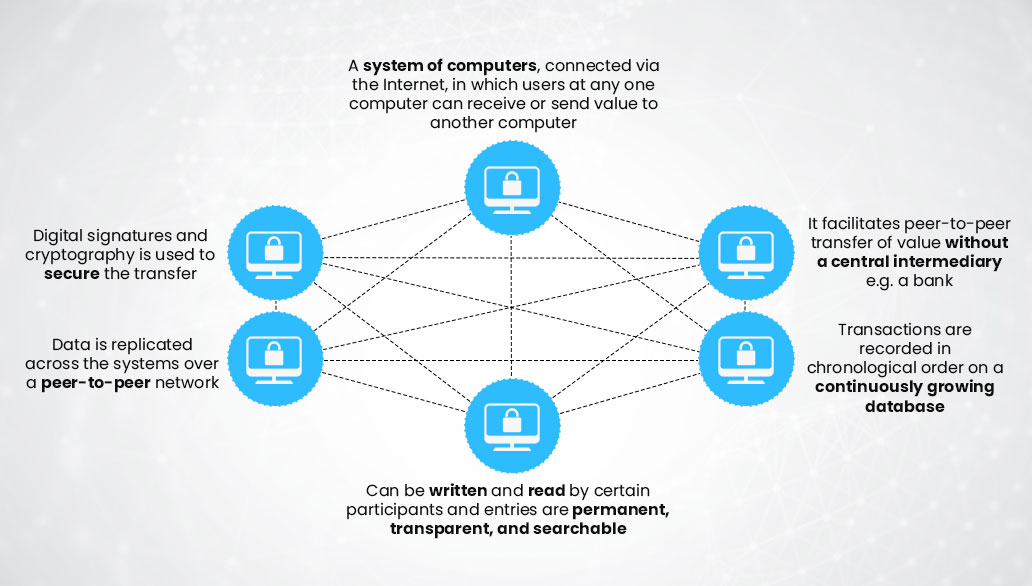-
There is a growing interest in C-suite level executives for blockchain and smart contracts. Market research firm Gartner forecasts that by 2025 the business value added by blockchain applications will increase to US$ 176 billion. An analysis by our experts on the development of mobility, digital transformation, and other transformations that impact the industry indicates that blockchain and smart contracts are creating opportunities across the value chain. However, we will concentrate primarily on the opportunities in automotive operations provided by blockchain-powered smart contract solutions development.
Blockchain Smart Contracts | Self-Enforcing Agreements
Due to being embedded in blockchain-managed computer code, a smart contract is an agreement that enforces itself automatically. The code includes a set of rules under which the parties to that smart contract agree to interact. The terms get automatically enforced when parties meet predefined if and then scenarios. Smart contracts provide frameworks for managing transactions between two or more parties effectively while replacing paperwork. Blockchain maintains the underlying principles and access rights that they control. It can be open, public, permissioned, or private ledger, thus, securing them from deletion, manipulation, and revision. Therefore, smart contracts provide a transparent and verifiable means of integrating governance rules and business logic into a few lines of code, which the majority consensus of a P2P network can audit and implement.
 Also, Read | Blockchain Smart Contract Solutions for Efficient Contract Management
Also, Read | Blockchain Smart Contract Solutions for Efficient Contract ManagementWhy Use Smart Contracts
Blockchain-based smart contracts provide a range of benefits for a wide variety of potential applications applicable to the automotive industry as well:
Faster, Automated Operations
Since smart contracts use software code for the automation of a range of tasks usually performed by manual means, they increase the speed of a wide variety of business operations significantly.
Lower execution risk
The decentralized process mechanism effectively removes the possibility of coercion, failure to execute, or mistakes, as the connected network handles the execution automatically than an individual group.
Fewer intermediaries
Smart contracts can minimize or eliminate dependence on third-party intermediaries by offering "confidence" in services like escrow between transacting parties.
Lower cost
When smart contracts power new processes, they require less human involvement and fewer intermediaries, thereby reducing costs. Also, Read | Smart Contract Solutions for Business | Advantages and Use Cases
Applications of Blockchain and Smart Contract Technology in the Automotive Industry
Automotive Supply Chain | Cargo Shipping
Implementing blockchain technology and smart contracts in the automotive sector can also offer various advantages to shipping companies involved in car shipments. Because of its vast volume of point-to-point contact between transportation companies, freight forwarders, customs brokers, governments, ports, and warehouses, the shipping industry today remains complex. All data about the shipment of a specific cargo is stored in the silos of the shipping company, rendering it unavailable to customers. Maersk, a multinational cargo shipper, has collaborated with IBM to use blockchain and smart contracts to ensure trust and openness in its supply chain and make shipment data available to all members of the supply chain at any time. They began using smart contracts to ensure automation across most paperwork, including agreement formation and contract signing. Implementing Smart Contracts enabled Maersk to remove hundreds of point-to-point communications with members of their automotive supply chain. It rendered the process of shipping cargo more effective and cost-efficient. Any supply chain participant may check shipment details with the blockchain, including who has submitted paperwork, where the shipment is, who has it, and where it is going at any given time. The blockchain provides secure data sharing and an archive that is tamper-proof for cargo records and shipping events. This technology will drastically reduce the number of delays and fraud while saving shipping companies millions of dollars. Also, Read | Making Supply Chains Smarter with Blockchain Smart Contracts
Automotive Insurance
The blockchain could bring substantial benefits to insurance companies. Both the immutability principle and the evidence of provenance of the technology, when combined with the potential of the smart contracts, would enable companies to manage their operational activities efficiently. Smart contracts may help a company verify the submission when a car insurer receives fraudulent information from false claims or any other channel. Through the blockchain, insurers will be able to confirm if a car needs significant repairs before the crash, which may be triggered by the technical problems of a vehicle, or verify any other details that the submitter has given. According to Reuters, Toyota, the Japanese vehicle maker, will partner with technology companies like MIT, BigchainDB, and Oaken Innovations. They are partnering to create blockchain and smart contract-powered automotive insurance applications. So, we'll see some of Toyota's usage-based blockchain insurance solutions sometime soon. Also, Read | Smart Contract Solutions for On-Demand Car Insurance
Car Rental
There is a paradigm shift from car ownership to car sharing, through car rentals or leases. This change is further motivated by the fact that cars are underused and stored (and inactive) most of the time, while car owners incur ongoing fixed costs such as insurance, tax, repairs, and parking. The use of blockchain in car rental provides a secure (from fraud) and reliable platform for car sharing. It a fact that is likely to encourage car sharing through P2P. Inbuilt immutable properties of blockchain and automation enabled by smart contracts provide a safe forum for both car owners (to list their cars) and customers alike. In the car rental industry, the idea of blockchain functions similarly to every other blockchain transaction. Service providers (or car owners) and end-customers registered on the blockchain can sign digital smart contracts based on pre-agreed laws. The smart contract also contains the required information, such as renter details (driving license verification, insurance, and credit card data) and car registration number, cost, mileage, rental period, and car owner's credentials. All financial transactions (rental payment) may be made either through a check or by buying associated cryptocurrencies and tokens to be registered on the blockchain. The use of smart contracts has made the system transparent and secure because contract knowledge is unchangeable.]
Car Leasing
The benefits of blockchain and smart contracts are most noticeable at the end of the lease period. For instance, when a customer returns a leased car. The distributed ledger removes conflicts existing between a service provider and end-customers in respect of end-of-lease payments. They establish transparency through the lease lifecycle, including transparent vehicle use records, mileage, fuel, repairs, tire adjustments, and insurance. It makes it easier to quantify any end-of-lease costs based on the smart contract's predefined terms. As per the smart contracts, recipients may get payments automatically in the form of cryptocurrencies or tokens. Darenta ICO is a Russian start-up in car rental. It has built a platform for existing car owners to rent their cars using a digital solution. It utilizes geolocation, smart contracts, and other blockchain technology. Also, Read | Blockchain Applications in the Automotive Industry | Advancing Innovation
Compliance Challenges
Blockchain is maturing while the demand is picking for autonomous cars. Automotive companies are considering blockchain to track, store, and pass digital records. They include vehicle identification, ownership, warranties, wear and tear, mileage, leases, loans, parts, and automotive service data. Blockchain and smart contracts will allow for the storage of these data in a decentralized, shared ledger format. The authorized parties will have access to a portion of this ledger data based on their access rights and needs. Thus, blockchain will allow vendors, authorities, and other entities in the mix to verify and use credentials in near real-time. Also, Read | Legal aspects of Smart Contract Deployment
Conclusion
Car manufacturers, resellers, and insurers are exploring blockchain, a technology used in many financial organizations. A few companies have already declared their readiness to research and put their abilities into practice in their business. Distributed ledgers powered technology like smart contracts can allow automotive companies to achieve numerous advantages in operations. They include reducing document workflow expenses, preventing fraud, boosting manufacturing, and securing the digital ecosystem.

Our Offices
INDIA
Emaar Digital Greens, Sector 61,
Gurugram, Haryana
122011.
Welldone Tech Park,
Sector 48, Sohna road,
Gurugram, Haryana
122018.














